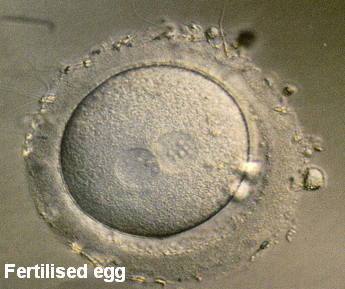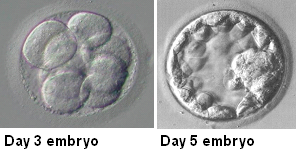
In vitro fertilization (IVF) is a process by which an egg can be fertilised outside the body and it is now used widely as a fertility treatment when the sperm sample is normal. Following stimulation of the woman’s ovaries with hormones, eggs are collected and placed in a dish inside an incubator before sperm are added about 4 hours later. Around 65% of the mature eggs will successfully be fertilised with a sperm to create an embryo (see image). The embryos are then cultured in the incubator for up to 5 days before being transferred into the uterus.

Embryo culture and transfer
Once embryos have been created in the laboratory, they will be cultured in small dishes in an incubator where they will undergo cell division. The day of embryo transfer is usually determined by embryo quality and you will be kept up to date on this by one of the embryology team. Embryo transfer is performed either on day 3 of development when the embryo has around 8 cells, or on day 5 at the blastocyst stage when the embryo has >100 cells.
Single embryo transfer
We encourage all of our patients to have an elective single embryo transfer as it is much safer to have a single baby rather than twins. The risk of twins is more than 20% of all pregnancies if two good quality embryos are transferred, so it is important to take this into account during discussions with your doctor.
Embryo freezing
Any good quality embryos which have developed but are not replaced can be frozen for use later with your consent. This is an efficient process and the pregnancy rate using frozen-thawed embryos is very good. This is especially important when discussing issues around single embryo transfer.
You will be given detailed information on all aspects of your treatment before your treatment.













